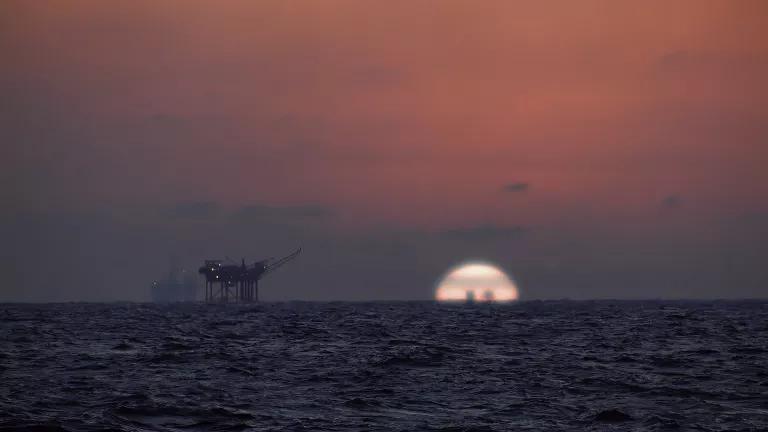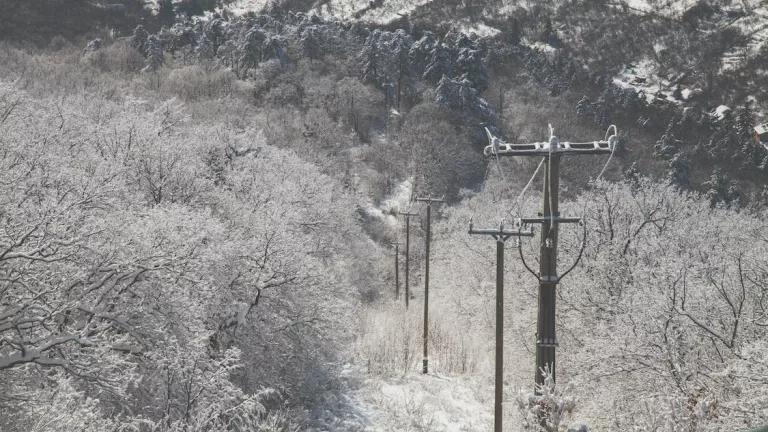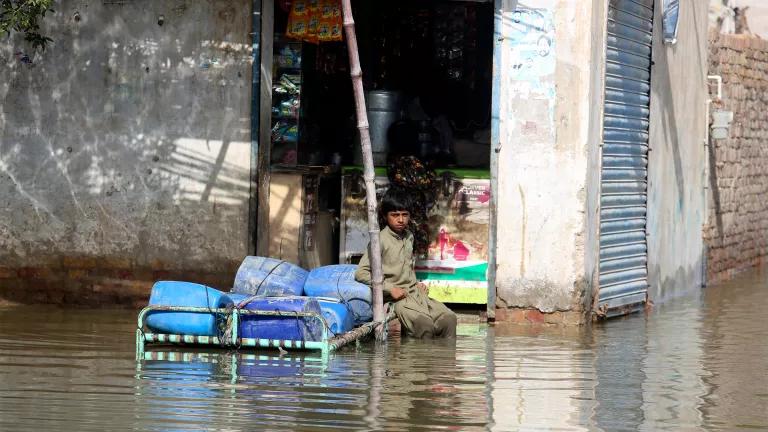Congress Responds to the Biden Administration’s Commonsense LNG Decision
Not long after the administration’s pause on permits, the fossil fuel industry—and its supporters in Congress—pulled out all the stops to oppose the decision and spread misinformation.
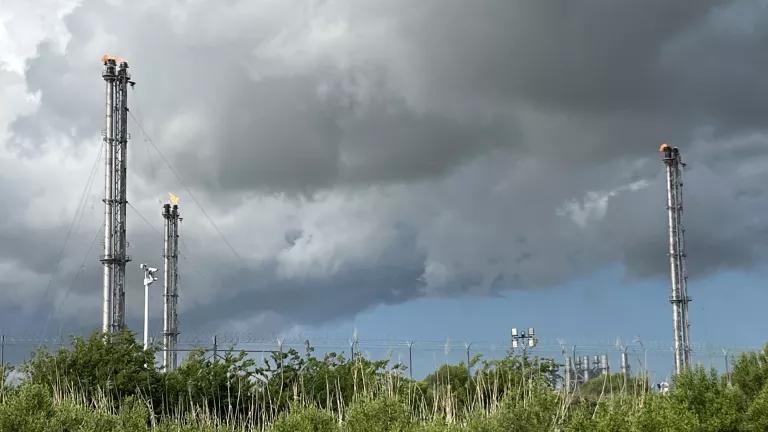
Sabine Pass LNG facility in Cameron, Louisiana
Talia Calnek-Sugin
This blog is co-authored by Talia Calnek-Sugin, a senior advocate who works with NRDC’s Sustainable FERC Project on federal LNG and transmission policy.
The House of Representatives voted today to pass H.R. 7176, a bill led by Representative August Pfluger (TX-11) that would strip the U.S. Department of Energy (DOE) of the responsibility to determine whether liquefied natural gas (LNG) exports would help or harm Americans before approving export permits to countries with which the United States does not have a free trade agreement (FTA). Instead, this legislation would place approval of these facilities under the Federal Energy Regulatory Commission’s (FERC) sole jurisdiction—and require FERC to deem these exports to be in the public interest.
This bill is not new. This is the third time in the 118th Congress that the so-called Unlocking our Domestic LNG Potential Act has been on the House floor—first as part of H.R. 1, the far-reaching House Majority handout to the fossil fuel industry, and then as part of its first attempt at a debt ceiling package. (Neither advanced beyond the House.)
What is new is that the Biden administration has signaled a willingness to stand up to Big Gas and reconsider the status quo of rubber-stamping LNG export approvals. Under the Natural Gas Act, the DOE is required to determine that an LNG export to a non-FTA country is “consistent with the public interest” before approving that export. The DOE has never deemed a proposed export inconsistent with the public interest, despite mounting evidence of adverse climate, environmental justice, and consumer impacts.
What is the LNG export pause?
The administration announced last month that it would pause approvals for new non-FTA LNG export permits while it updates the underlying economic and environmental analyses by which it makes public interest determinations. The DOE has been relying for 40 years on guidance that was intended for LNG imports. As NRDC Senior Attorney Gillian Giannetti put it in her congressional testimony last week, the pause “enables the DOE to update these outdated tools, receive public comment, and avoid issuing decisions that are legally unsound. In other words, the administration’s pause puts the horse back in front of the cart.”
Environmental organizations, frontline communities, and consumer groups celebrated the pause as a win for climate, environmental justice, and economic justice. Re-evaluating the criteria used to approve LNG exports will give the DOE the opportunity to better understand the climate impacts of the LNG life cycle, its public health implications, and the extent to which it raises energy costs for consumers. This also signaled President Biden’s willingness to stand up to the powerful oil and gas industry—and sent a global cue that the United States is taking seriously the COP28 agreement to transition away from fossil fuels.
The administration’s announcement has a narrow but critical impact—on new LNG export permit approvals only. The United States is already the world’s number one LNG exporter, and volumes of liquefied natural gas from already-approved export permits are set to more than triple this decade. The administration’s pause does not touch these exports, nor does it impact non-FTA export authorizations or FERC permit approvals. It also does not presuppose the outcome of the DOE’s analysis: The DOE could continue to approve LNG exports once the pause is over if they are in the public interest.
But not long after the administration’s commonsense move, the fossil fuel industry—and its supporters in Congress—pulled out all the stops to oppose the decision and spread misinformation. Here’s a quick run-through of what’s been happening on the Hill.
Congressional hearings
Just days after the administration’s announcement, leadership of the House Committee on Energy and Commerce announced that it would hold a hearing on the pause, which it misleadingly titled as an “LNG export ban.” Throughout the hearing, misinformation was rampant, including: the administration’s action amounting to a ban (in reality, the U.S. LNG exports will still grow exponentially, based only on already-approved exports); LNG exports being good for the climate because they displace coal (in reality, LNG’s life cycle is extremely greenhouse gas intensive and has little impact on displacing coal abroad); U.S. allies feeling slighted by the administration’s decision (whereas, in reality, allies around the world have welcomed the commonsense pause).
Giannetti set the record straight on what the administration’s pause does and does not do in her opening statement:
“This action does not pause any current LNG exports, any already approved LNG exports, or any future FTA exports. And yet, it represents the boldest action that any administration has ever taken to ensure that the DOE is properly assessing the impacts of exporting LNG on the U.S. public interest. In short, the January 26 pause is a commonsense move that both respects our allies and puts the U.S. public interest front and center. That is exactly what the Natural Gas Act demands.”
You can watch some highlights from her testimony here.
Many members of Congress rallied around the administration’s move, highlighting the environmental, economic, and security risks associated with unfettered LNG expansion. A common theme was the impact of LNG exports on domestic energy prices, which recent research found cost U.S. consumers more than $100 billion over 16 months. As Ranking Member Frank Pallone Jr. (NJ-06) put it: “LNG exports can drive up energy prices here at home, which is what happened two years ago when our natural gas prices tripled.” Multiple representatives raised the issue of the global warming impact of methane, which is 80 times more powerful than carbon dioxide; in this exchange, Giannetti explained that methane leaks along the supply chain can mean that LNG is even worse for the climate than coal. Representative Nanette Barragán (CA-44), among others, emphasized the disproportionate public health and environmental impacts that LNG exports have on low-income communities and communities of color. Finally, multiple representatives debunked the national security arguments, pointing out that the United States has more than met Europe’s LNG needs and that the same representatives crying wolf on the LNG pause were also voting against the foreign aid package that included Ukraine aid.
Just two days later, Senator Joe Manchin (D-WV), chair of the Senate Committee on Energy & Natural Resources, called a similar hearing, where Deputy Energy Secretary David Turk testified, followed by a lopsided panel featuring the heads of the Center for LNG (a U.S. LNG lobby group) and Eurogas (a European gas lobby group). Deputy Secretary Turk clearly laid out the rationale behind the DOE’s decision to pause and reassess:
“Since 2018 (the last time the DOE underwent similar analysis), there have been truly transformative changes that need to be fully incorporated into our analysis. And, in turn, this updated analysis will allow us to better address a wide variety of key questions that need to be answered for us to make public interest determinations.”
Legislation
Before the dust had time to settle, members of the House and Senate drafted legislation that would not only threaten the administration’s commonsense pause but fundamentally—and permanently—weaken government oversight over the LNG export industry.
As the Senate was considering its national security supplemental (i.e., military/foreign aid) package, Senators John Barrasso (R-WY) and Kevin Cramer (R-ND) filed amendments that would undermine the federal government’s responsibility to assess whether LNG exports are in the public interest of the American people. Senator Barrasso’s amendment would have effectively removed the DOE’s ability to review whether authorizing LNG exports to non-FTA countries would be in the public interest, shortened FERC’s due diligence timelines, and restricted judicial review. Senator Cramer’s amendment, meanwhile, took direct aim at the administration’s reassessment of LNG exports, prohibiting the DOE from using funds to update the analysis used to determine whether LNG exports are in the public interest. Luckily, following opposition, neither amendment came to the floor.
Which brings us back to H.R. 7176. In response, NRDC joined more than 60 other organizations in sending a letter to Congress opposing the legislation and supporting the administration’s commonsense pause. The administration also published a Statement of Administration Policy stating that it “strongly opposes passage of H.R. 7176.”
Even though H.R. 7176 passed the House this afternoon, it is almost certain not to go anywhere beyond that in its current form. And it’s also almost certain that fossil fuel industry allies are not done waging war on the administration’s small step forward on LNG export policy, continuing to waste valuable floor time.
The oil and gas industry has thrown an all-out temper tantrum in response to a moderate, commonsense, and long-overdue administration policy. If LNG exports are as good as its supporters claim (for the climate, for the country’s economy, for national security), then why the fear of updating the analysis? If there’s nothing to hide, why not just let the DOE do its job?
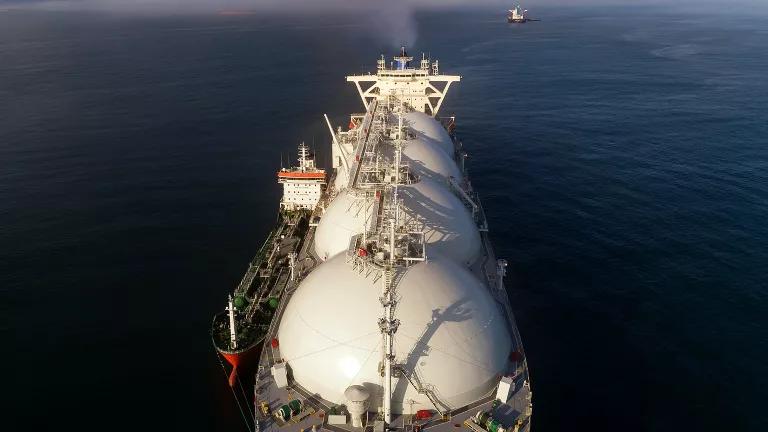
Help protect communities from dangerous liquefied natural gas!
Liquefied natural gas (LNG) is a dangerous substance composed primarily of methane, a greenhouse gas 80 times more potent than carbon dioxide. The Biden administration has paused LNG exports—and now we must urge it to phase out all climate-wrecking fuels.


